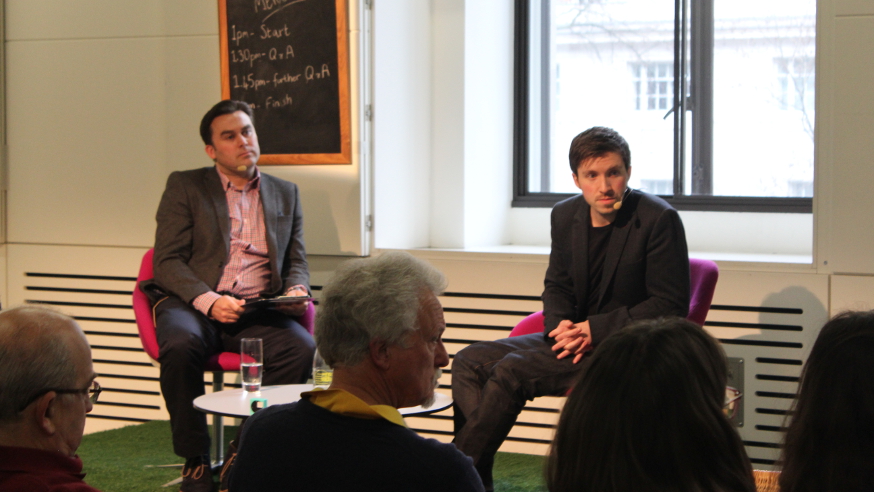When you attend a scientific talk, you don’t expect to do so while eating lunch to the sound of birdsong. But that’s exactly what I did last Wednesday, when Dr Chris Tape, a cellular biochemist at The Institute of Cancer Research, and a Sir Henry Wellcome Postdoctoral Fellow, talked about his research as part of the Wellcome Trust Packed Lunch series of talks.

These drop in, lunchtime science talks are obviously very popular, and a full audience of around 80 people gathered to munch sandwiches, eat free apples, and hear Dr Tape interviewed by Tom Anthony, from the Wellcome Trust next door.
The interview began with a brief overview of what Dr Tape studies – cell communication, with a particular focus on pancreatic cancer. He had a store of amazing facts to engage this non-specialist audience – did you know that we’re made of around 37 trillion cells? And they all work together, so studying them in their context is important. Dr Tape works in the ICR Cell Communication Team (in collaboration with Systems Oncology in Manchester and Biochemical Engineering at MIT), and uses mass spectrometry to look at the complete protein environment of a tumour cell.
We moved on to pancreatic cancer, a disease that will affect one in 75 in the UK, but which is often overlooked. Dr Tape pointed out that if you looked at the medical mannequin outside, you would struggle to find the pancreas.
Pancreatic cancer is of great interest to communication specialists, because half of the cells in a pancreatic tumour are actually healthy they are just ‘bullied’ by the cancer cells into becoming part of a tumour. As a later question will reveal, these cells go back to normal if they can just get away from the toxic environment created by mutated cancer cells.
The audience was really interested in cancer research in general, and the questions reflected that. Audience members asked questions about everything from the use of the immune system to beat cancer (which also relies on cell communication) to whether or not larger people have more cells! Many came to the research with completely fresh eyes, with one gentleman suggesting that, if cells communicate, why can’t we just tell them not to be cancerous? The answer? Maybe we can, but it would need a lot more research!
The event felt like a great way to introduce a wide spectrum of people to the realities of life in science. The personal connection with the audience, and the support of the interviewer, meant that the conversation never dragged, or became overly complicated. According to Dr Tape, the questions were “Really interesting, nothing at all like what you’d get at a science conference. The whole experience has made me think much more deeply about my work, and where it sits in the wider world of cancer research.”
The attendees left with a new understanding of the ICR and its research. And as I walked out, I saw two audience members standing by the medical mannequin, in deep concentration. “So come on, where is that pancreas then?”
A recording of the interview will be available shortly at this link: http://www.wellcomecollection.org/packed-lunch-podcast